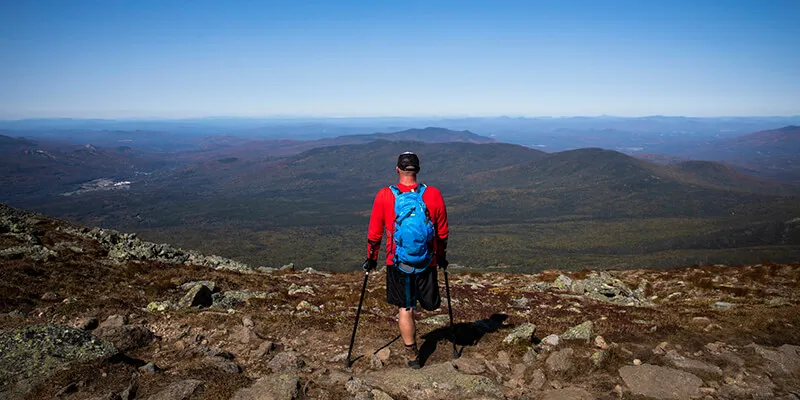The 22-mile, eight-peak traverse of the White Mountains Presidential Range will inevitably pose some body- and soul-testing moments. Every hiker setting out on the fabled route knows it.
For alumnus Dana Albrycht, Class of 2002, one of those moments came early on. He and three close friends had begun their journey just before midnight on September 19, 2020. They reached their first ridgeline summit, 5,367-foot Mount Madison, near 4:30 a.m. Still in the dark, temperatures in the teens, with the range’s infamous winds whipping, the group of hikers could be forgiven if a thought something like “was this really a good idea?” might have crossed their minds.
But a clear day dawned as they continued on toward Mount Adams. Soaking in the sun’s warmth and getting their first glimpse of the sublime, hard-earned view, Albrycht was struck with a deep sense of gratitude for the moment, the place, and his trail companions. He says, “It was honestly one of the most beautiful experiences of my life.”
The challenges all hikers face on those granite ridges was greatly amplified by the fact that Albrycht took on the traverse on one leg, no prosthetic, and a pair of crutches. (Due to arthritis pain in his hip, he stopped wearing a prosthetic several years ago.)
(Photo courtesy Dana Albrycht)
A two-time Paralympian in swimming and a marathon runner, Albrycht likes an endurance challenge and loves time in the wild. Another reason motivated his ambitious hike in New Hampshire, a fundraiser, “Crutchwalker: Hiking to Help the Disabled,” for adaptive sports programs and other support organizations.
Born with a deformity in his hip socket, doctors amputated Dana Albrycht’s right leg above the knee at a young age. A strong swimmer throughout childhood, he enrolled at UVM to study psychology and with hopes to swim varsity. “Coach Joe Fischer welcomed me with open arms and never treated me any differently than the other swimmers, which I greatly respected and appreciated,” Albrycht says. He would specialize in the 100 and 200 butterfly, also competing for the team in relays, and was elected captain senior year.
The squad was a combined men’s and women’s roster in Albrycht’s era. He says that created a dynamic that felt more like family than team, building a strong support network during college and friendships that have lasted far beyond.
Athletics and the outdoors have remained central to his life, as Albrycht and his wife, Jessica, raise their three children—Denali, Acadia, and Scottlyn—in Simsbury, Conn. Asked to rank the White Mountains hike among the toughest things he has tackled in the name of fun, he mentions the 2008 New York City Marathon. Twenty-six miles on NYC streets or peak after peak after peak in New Hampshire, both can be trying. “But here’s the difference,” Albrycht says. “Though the length and terrain of the Presidential Traverse makes it incredibly challenging, it’s just filled with so much beauty. When I'm up in the mountains is when I'm at my happiest.” (Sorry, Pulaski Bridge.)
Still, by the second day with eight peaks behind him and four miles of descent to the final destination at Crawford Notch, Albrycht’s hands and wrists were in major pain from his weight’s cumulative pressure on the downhills. At mind-over-body moments like those, he has learned to focus, analyze, and act on three key words: accept, adapt, overcome.
Albrycht says, “This is the exact process I’ve used to not only be successful as an athlete, but it really is what’s allowed me to make it through the various challenges I’ve experienced in my life and, ultimately, become a much stronger person for doing so.”
